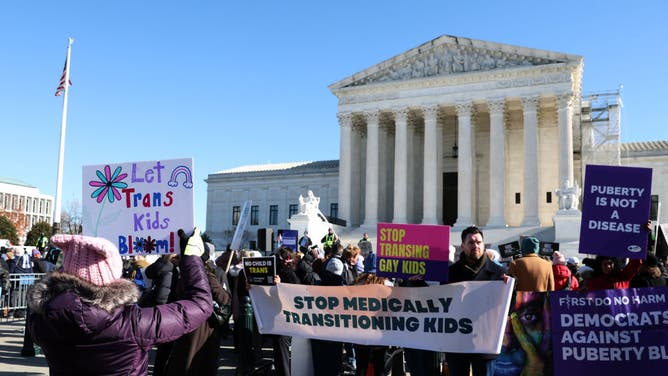Justice Sotomayor Dismisses Dangers Of Child Puberty Blockers Because ‘Even Aspirin’ Has Risks
Child sex change procedures might be no riskier than simply taking aspirin — at least, that's according to Supreme Court Justice Sonia Sotomayor.
The Supreme Court heard oral arguments on Wednesday in a high-profile case regarding whether states have the authority to ban minors from receiving gender transition medical care under the Equal Protection Clause of the 14th Amendment.
The case, United States v. Skrmetti, centers on a Tennessee law that bans gender-transition treatments for minors in the state. The law also takes aim at healthcare providers who administer these treatments, opening them up to fines, lawsuits and liability.

The Supreme Court heard arguments on Wednesday on whether states can legally ban children from undergoing sex-change medical procedures.
(Photo by Kevin Dietsch/Getty Images)
In one exchange, Tennessee Solicitor General Matthew Rice explained that puberty blockers and sex-change surgery would cause irreparable harm to children who aren't old enough to consent.
"They cannot eliminate the risk of detransitioners. So it becomes a pure exercise of weighing benefits versus risks," Rice said. "And the question of how many minors have to have their bodies irreparably harmed for unproven benefits is one that is best left to the legislature."
RELATED: Kids Were Rushed Into 'Gender Affirming' Care, New York Times Confirms
But Sotomayor interrupted him and downplayed those risks.
"I'm sorry, counselor, every medical treatment has a risk, even taking aspirin," Sotomayor said. "There is always going to be a percentage of the population under any medical treatment that's going to suffer a harm.
"So the question in my mind is now, 'Do policy makers decide whether one person's life is more valuable than the millions of others who get relief from this treatment?'"
According to the Mayo Clinic, puberty blockers can cause infertility and have lasting detrimental effects on bone growth and bone density. Further, sex-change surgeries — in other words, genital mutilation — are irreversible.
That seems a bit riskier than popping an aspirin for a headache.